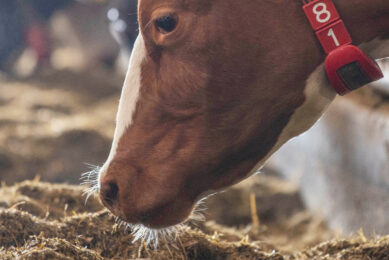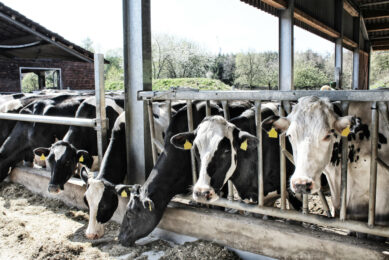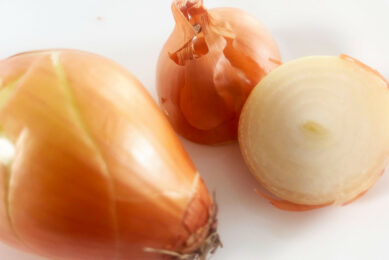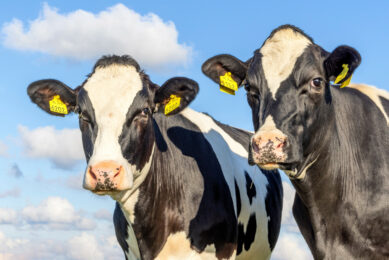Dairy Diary: July business update

What did the month of July unveil – what’s NEW in the dairy world? From a new CEO at Nutreco to smarter drying off this summer, check out the latest developments and products in the sector…
New CEO of Nutreco
Nutreco CEO Rob Koremans has announced that he will be retiring from his role this summer after leading the company for the past 3 years. With effect from August 15 2021, Fulco van Lede will join Nutreco as CEO. Fulco was appointed as a member of the Executive Board of Directors of SHV on July 1, 2018, after having served in different positions in Makro and SHV Energy; in the latter ultimately as CEO of the SHV Energy Board. He has played an important role in supporting the SHV Groups and in further defining a sustainable future for SHV. After August 15, Rob will stay on in the company until the end of the year as an advisor to the Nutreco Executive Leadership Team to ensure a smooth transition and to facilitate the startup of a new fundamental research unit that will develop and introduce unique proprietary products, such as feed additives and specialty ingredients.

New chief science officer at Nutreco
With immediate effect, David Bravo has joined Nutreco as Chief Science Officer (CScO) to lead the company’s new fundamental research unit, which will bring ideas to proof of concept and replenish the company’s new product pipeline. David joined the company from Land O’Lakes feed business unit, where he was most recently director innovation & technology scouting.
David has a strong track record of innovating in the feed industry, having served in a variety of positions including leadership ones in feed, premix and feed additive companies including In Vivo NSA (now known as Neovia) in France, Pancosma in Switzerland, and Land O’Lakes in the United States. David studied nutrition, molecular physiology and physiology at universities in France; he is also an alum of Harvard Business School.

HealthyLife research grant awarded to dairy project
Dr Tom Chamberlain, veterinarian and owner of Chalcombe Consultancy, is recipient of a HealthyLife research grant awarded by Trouw Nutrition, the animal health division of Nutreco. Dr Chamberlain’s grant of € 10,000 was awarded for his project, “Raising the awareness of heat stress problems with dairy farmers”. The HealthyLife Project aims to improve the sustainability of dairy farming by increasing the longevity and performance of dairy cows. Dr Chamberlain’s award-winning research has two critical aims. First, it seeks to increase awareness that heat stress can affect cattle in temperate climate zones such as Europe and the coastal areas of Latin America and North America. A second aim is to establish Temperature Humidity Index (THI) data for grazing cows, as data currently represents only housed cattle. The research project also aims to provide farmers with a better tool to assess heat stress in their herds. To find out more about the HealthyLife programme for sustainable dairy farming, more here.

Smarter drying off this summer
Dairy farmers drying off cows this summer can take advantage of improved udder protection by incorporating T-Hexx Dry into their routine. An external barrier for application following the use of dry cow therapy and/or internal teat sealant, T-Hexx Dry assists the natural keratin plug while providing a physical barrier on and in the teat for up to 7 days. In some cases where mastitis is not a concern, T-Hexx Dry may negate the need for dry cow therapy and internal teat sealants helping farmers conform to RUMA’s antibiotic-use reduction targets when drying off and if deemed appropriate by the herd’s veterinarian. “Rather than being inserted into the teat canal and potentially introducing new infections, T-Hexx Dry is administered as a dip, forming a physical barrier film on the teat and in the teat canal. This allows the sealant to act as the keratin plug, working as the cow’s first line of defence against pathogens,” says Progiene dairy hygiene specialist Alison Clark. From now until the end of August, farmers who buy 5 litres of T-Hexx Dry will receive 1 litre free. To learn more about the T-Hexx Dry, how to apply it, and the offer, click here.

Lallemand Animal Nutrition opens new office in South Korea
Lallemand Animal Nutrition is pleased to announce the recent opening of its new office in Seoul, South Korea. Lallemand Korea is dedicated to helping partners and customers optimize animal performance and wellbeing with specific, natural microbial products and service solutions. Its product portfolio offers high-value solutions for ruminants, swine, poultry, and companion animals. The new office will be led by Mrs Choi Si Yeong, Country Manager for Lallemand Animal Nutrition South Korea.
Agolin and Barry-Callebaut join forces
Agolin SA, a Swiss based company which develops and markets feed additives based on botanical compounds, has joined forces with global chocolate producer Barry Callebaut and Gold Standard (GS), a leading carbon reduction project development and verification provider, to establish a methodology in which dairy producers can become suppliers of low carbon milk. Two pilot studies were established, one in the Netherlands and one in the US, involving 65 farms and over 15,000 cows in total in order to develop the methodology for the concept. The GS methodology confirmed an average reduction of 1,200 metric tonnes (MT) over a six month period in the Netherlands and a reduction of 500 MT by August of 2020 in the US. Agolin Ruminant, when it is included in dairy and cattle feed at a rate of one gram per head each day for adult animals, has been shown to influence methanogenesis, the production of methane, in the rumen and thereby reduce methane release to the environment by the animal. In addition, the product has also shown to improve feed efficiency.

Evonik expands NIR services for feed raw materials and feeds
With the implementation of the ISO 12099 standard for near-infrared spectroscopy (NIR), updated and expanded calibrations for feed raw materials and feeds, along with new functionalities in Aminonir Portable, Evonik now offers its customers in the feed industry an even more comprehensive service. In addition to feed additives, such as amino acids, and concepts for protein-reduced diets, analytical services are a component of Evonik’s system solutions for feeding farm animals in a healthy, efficient, and sustainable way. For decades, Evonik has relied on a combination of wet chemistry and near-infrared spectroscopy (NIR). “Through elaborate wet chemical analyses, we have created the data basis for reliable calibrations of NIR spectra,” says Dr Ingolf Reimann, head of Analytical Services in the Animal Nutrition business line. These calibrations have recently been carried out in accordance with ISO standard 12099. For benchtop NIR instruments, Evonik has expanded its broad offerings with new calibrations for various insect meals and marine species meals such as shrimp, squid, and krill, as well as for cow feed (beef cattle and dairy cows). Calibrations for a number of raw materials such as corn, fish meal and soybean meal have been updated in line with the regular schedule.
Devenish’s initiative to manage carbon balance and cut emissions
Agri-technology company Devenish, in collaboration with global professional services firm Accenture, has launched a sustainable farming initiative which will help decarbonise the global agriculture sector by supporting farmers to continue to produce nutritious meat and milk while dramatically improving their carbon balance. By accurately measuring on-farm carbon emissions and, uniquely, carbon sequestration, it is estimated Agrinewal will enable over five million tons of carbon to be sequestered by 2030. This will create new value for farmers across the island of Ireland, and substantially accelerate the achievement of climate goals while also improving biodiversity, water quality and overall farm resilience. Using the latest cloud-based technology, it provides a Carbon Balance Sheet and identifies actions which will help the wider agricultural sector reach net zero carbon emissions and beyond, boosting the environmental credentials for producers, processors and at every point on the food chain.
For more information on Agrinewal go here.

The National Farm Management Conference is back
The National Farm Management Conference is back for another year with an exciting new theme focusing on the future of agricultural management.
The conference, titled ‘Agriculture 2028 – transitioning to life beyond direct payments’, welcomes both members and non-members of the Institute of Agricultural Management (IAgrM) and will take place in London at the Queen Elizabeth II Conference Centre on 16th November 2021.
Speaking about the conference, Carl Atkin, vice chairman at IAgrM, says: “After over 20 years of direct payments coming to an end in the near future, we felt the industry needs to think about what’s next. “There’s a lot of talk about the approaching changes, however, we want to take the debate forward, to what it will look like afterwards, delving into skills, competencies and issues that those working in agricultural management need to be aware of to future proof their farm businesses. To book your tickets please visit the National Farm Management conference website.
Hamlet Protein strenghtens ruminant team
Ruminant specialist Nicholas Anglade joins Hamlet Protein as category manager ruminants to further support the company’s ambition in young animal nutrition. With a species specialist for calves, the company makes work of its strategy to invest in best-in-class nutritional support for customers across the world. Nicholas Anglade, French citizen, graduated from Rennes National School of Agronomy and Essec Cergy Pontoise, brings with him a wealth of experience and strong network from his career in leading international companies. “Calf nutrition has always been my passion. I am truly excited to join Hamlet Protein and to have the opportunity to contribute to Hamlet’s ambitious growth agenda,” stated Nicholas Anglade. Hamlet Protein produces soy-based protein ingredients for young piglet, poultry, and cattle feed at two production plants in Denmark and the US.

Ensuring safe development of new animal feed products
New research by a team of scientists at Walloon Agricultural Research Center (CRA-W), Belgium has explored the current analytical techniques available for testing animal feed ingredients. Published in Burleigh Dodds Science Publishing’s latest title – Developing animal feed products – the research enhances our understanding of the techniques implemented to ensure feed safety and quality, as well as the key detection methods applied to identify hazardous materials in feed that may present a risk to both animals and humans. Chapters in Part 1 detail the development of animal feed products, primarily discussing the techniques used to identify new animal feed ingredients and additives, the techniques used to improve the nutritional value and digestibility of animal feed, as well as the analytical techniques relied upon to ensure feed quality and safety. Chapters in Part 2 explore the efficacy of animal feed products, the contamination risks associated with animal feed development, the risk management systems and preventative measures that can be administered to reduce this risk, as well as the development of product dossiers for regulatory approval of new animal feed products.

Join 13,000+ subscribers
Subscribe to our newsletter to stay updated about all the need-to-know content in the dairy sector, two times a week.










